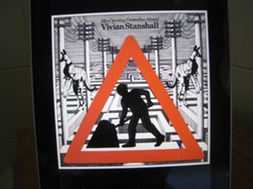Sunday, 29 July 2012

So, what does an artist do when the record company only presses 5,000 copies your debut solo album, Men Opening Umbrellas Ahead, then promptly deletes it?
Bear in mind, before you answer that question, the company in question was Warner Brothers, an outfit whose Stateside roster included such hip but relatively low-selling names as Ry Cooder, Randy Newman and Little Feat, all of whom went on to move a relatively substantial number of units but never managed sales figures that matched their critical acclaim.
A sensitive artistic type might perhaps slink off to lick his wounds in some dingy garret, but Vivian Stanshall was hardly the shrinking artistic violet, was he? No, if you're the man behind the more extreme dadaist tendencies of the Bonzo Dog Doo Dah Band (not that any of the other key players in the Bonzos was exactly straight) you destroy their boardroom and place a bag of bluebottle maggots behind the label president's office radiator. Cop that, young Harry!
On the other hand, even a cursory listen to Men Opening Umbrellas Ahead would, however, prompt the average listener to agree that, yes, I can understand the reservations. Those other names on the Warner Brothers roster had something approaching commercial potential, but on Men, Mr Stanshall, freed from the relative restraining collaborative influence of Neil Innes, his main collaborator in the Bonzo era, headed off to investigate the outer reaches of his considerable imagination.
Exposure to other expressions of the same outré adventurism would have the listener knowing what to expect, but, with the exception of the original Rawlinson's End on the Bonzos contractual obligation Let's Make Up and Be Friendly most of those expressions came after Men Opening Umbrellas Ahead.
While Innes was there through sessions at The Manor, Trident and Apple Studios, as were Traffic (at this point Steve Winwood, Jim Capaldi, Ric Grech, Gaspar Lawal and Rebop Kwaku Baah) and in the absence of co-writers (apart from the opening Afoju Ti Ole Riran (Dead Eyes), co-written with Gaspar Lawal) everything was written and arranged by Stanshall and, not to put too fine a point on it, it shows. Where you could count on Innes to deliver a veneer of commerciality or pop sensibility, what's on offer here veers off towards territory where the buses don't run without quite getting there and while it's not as confronting as it might have been it's hardly Top 40 potential either.
What is there, however, is the Stanshall verbal imagination, expressed in words that don't quite fit in the standard rock'n'roll lexicon and contain frequent references to the Stanshall virile member.
From the opening Afoju Ti Ole Riran (Dead Eyes) which you can’t help reading as a burst of invective against his record company in particular, the music industry in general or Western Society as a whole (or, indeed, all three) through to the concluding Strange Tongues (they’ve tacked both sides of the Lakonga / Baba Tunde onto the end as bonus tracks, but Strange Tongues is the actual conclusion of the actual album) you’re in the recorded presence of one of the great English eccentrics, a man whose mind roamed paths that exist somewhere on the other side of linguistic inventiveness.
Swingin’ jowls, a puke-box & an ulcer here, the Avant-Gardener pruning his beard over there, one’s left wishing someone had the foresight to declare the man an International Treasure and do something to ensure his survival.
Much of it was, of course, fuelled by drink, and there’s probably no way he was going to live through to a ripe old age, but take Men, follow it with a visit to Sir Henry at Rawlinson End and an excursion to the high veld and Ndidi’s Kraal and place a tick beside the observation that Teddy Boys Don’t Knit and you can’t help wishing someone had been around to ensure more of Stanshall’s imaginings were preserved for posterity.
Oh, and if you're inclined to head over to iTunes and investigate further, click on the one with the copyright notice that reads Estate of Vivian Stanshall 2012...